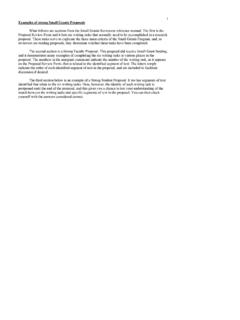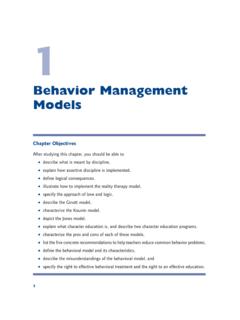Transcription of A Brief Summary of Supervision Models - Gallaudet University
1 A BRIE Summary O Supervision Models by Ken ra L. Smith, , LPC, ACS Gallaudet University September 2009 Clinic l Supervision for ment l he lth profession ls st rted out much like pprenticeships in other fields. Th t is, student/ pprentice with minim l skill/knowledge would le rn the work by observing, ssisting, nd receiving feedb ck from n ccomplished member of the s me field. It w s believed th t bec use the m ster w s quite good t the work, he or she would be equ lly good t te ching/supervising.
2 In f ct, this is not the c se. Tod y, we re lize th t, though clinic l Supervision nd counseling h ve much in common ( , the bility to eng ge in n interperson l rel tionship), the two t sks lso utilize sep r te nd distinct skills. This me ns th t m ster clinici n m y not be lw ys be m ster supervisor without the ddition of tr ining nd competency in supervisory knowledge nd skills. Furthermore, the concept of m ster- pprentice Supervision evokes hier rchy of power th t f vors the m ster s the uthority, dyn mic th t is not supported in tod y s liter ture on Supervision .
3 It is lso documented th t clinic l knowledge nd skills re not s e sily tr nsferr ble s the m ster- pprentice model implies (F lender & Sh fr nske, 2008). Observing experienced clinici ns t work is without question useful tr ining tool, but is not sufficient to help students develop the skills necess ry to become skilled clinici ns themselves. Development is f cilit ted when the supervisee eng ges in reflectionon the counseling work nd rel tionship, s well s the Supervision itself. Thus, clinic l Supervision is now recognized s complex exch nge between supervisor nd supervisee, with supervisory Models /theories developed to provide fr me for it.
4 In n effort to give the re der found tion for underst nding different Supervision Models , this rticle highlights inform tion g thered from v riety of uthors on the topic of Supervision . It does not represent ll Models of Supervision , nor does it provide comprehensive description of e ch supervisory model presented. R ther, the following presents s lient defining ch r cteristics of selected Models . For further le rning, re dings from the reference section t the end of this p per m y be helpful. Psychotherapy-Based Supervision Models As expl ined bove, clinic l Supervision st rted s the pr ctice of observing, ssisting, nd receiving feedb ck.
5 In this w y, Supervision follows the fr mework nd techniques of the specific psychother py theory/model being pr cticed by the supervisor nd supervisee. As the need for specific supervisory interventions bec me evident, supervisory Models developed within e ch of these psychother py theories/ Models to ddress this need. Psychother py-b sed Models of Supervision often feel like n tur l extension of the ther py itself. Theoretic l orient tion informs the observ tion nd selection of clinic l d t for discussion in Supervision s well s the me nings nd relev nce of
6 Those d t (F lender & Sh f nske, 2008, p.)
7 9). Thus, there is n uninterrupted flow of terminology, focus, nd technique from the counseling session to the Supervision session, nd b ck g in. Sever l ex mples of specific psychother py-b sed Supervision Models re described briefly below. Re ders interested in le rning more bout specific psychother py-b sed Supervision ppro ch re referred to the references for further re ding. Psychodyn mic Appro ch to Supervision : As noted bove, psychodyn mic Supervision dr ws on the clinic l d t inherent to th t theoretic l orient tion ( , ffective re ctions, defense mech nisms, tr nsference nd countertr nsferece, etc.
8 Fr wley-O De nd S rn t (2001) cl ssify psychodyn mic Supervision into three c tegories: p tient-centered, supervisee-centered, nd supervisory-m trix-centered. P tient-centered beg n with Freud nd, s the n me implies, focuses the Supervision session on the p tient s present tion nd beh viors. The supervisor s role is did ctic, with the go l of helping the supervisee underst nd nd tre t the p tient s m teri l. The supervisor is seen s the uninvolved expert who h s the knowledge nd skills to ssist the supervisee, thus giving the supervisor consider ble uthority (Fr wley-O De & S rn t, 2001).
9 Bec use the focus is on the p tient, nd not on the supervisee or the supervisory process, very little conflict occurs between supervisor nd supervisee, s long s they both interpret the theoretic l orient tion in the s me w y. This l ck of conflict or stress in the Supervision sessions often reduces the supervisee s nxiety, m king le rning e sier. Conversely, if conflict were to develop using this model, Supervision could be impeded by not h ving w y to de l directly with it (Fr wley-O De & S rn t). Supervisee-centered psychodyn mic Supervision c me into popul rity in the 1950s, focusing on the content nd process of the supervisee s experience s counselor (Fr wley-O De & S rn t, 2001; F lender & Sh fr nske, 2008).
10 Process focuses on the supervisee s resist nces, nxieties, nd le rning problems (F lender & Sh fr nske). The supervisor s role in this ppro ch is still th t of the uthorit tive, uninvolved expert (Fr wley-O De & S rn t), but bec use the ttention is shifted to the psychology of the supervisee, Supervision utilizing this ppro ch is more experienti l th n did ctic (F lender & Sh fr nske). Supervisee-centered Supervision w s d pted to fit sever l psychodyn mic theories, including Ego Psychology, Self Psychology, nd Object Rel tions (Fr wley-O De & S rn t, 2001).




